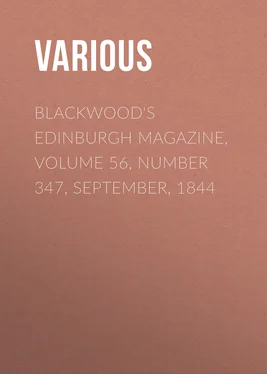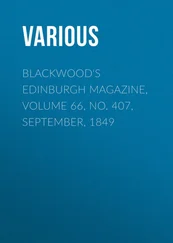Various - Blackwood's Edinburgh Magazine, Volume 56, Number 347, September, 1844
Здесь есть возможность читать онлайн «Various - Blackwood's Edinburgh Magazine, Volume 56, Number 347, September, 1844» — ознакомительный отрывок электронной книги совершенно бесплатно, а после прочтения отрывка купить полную версию. В некоторых случаях можно слушать аудио, скачать через торрент в формате fb2 и присутствует краткое содержание. Издательство: Иностранный паблик, Жанр: foreign_antique, periodic, foreign_edu, на английском языке. Описание произведения, (предисловие) а так же отзывы посетителей доступны на портале библиотеки ЛибКат.
- Название:Blackwood's Edinburgh Magazine, Volume 56, Number 347, September, 1844
- Автор:
- Издательство:Иностранный паблик
- Жанр:
- Год:неизвестен
- ISBN:нет данных
- Рейтинг книги:3 / 5. Голосов: 1
-
Избранное:Добавить в избранное
- Отзывы:
-
Ваша оценка:
- 60
- 1
- 2
- 3
- 4
- 5
Blackwood's Edinburgh Magazine, Volume 56, Number 347, September, 1844: краткое содержание, описание и аннотация
Предлагаем к чтению аннотацию, описание, краткое содержание или предисловие (зависит от того, что написал сам автор книги «Blackwood's Edinburgh Magazine, Volume 56, Number 347, September, 1844»). Если вы не нашли необходимую информацию о книге — напишите в комментариях, мы постараемся отыскать её.
Blackwood's Edinburgh Magazine, Volume 56, Number 347, September, 1844 — читать онлайн ознакомительный отрывок
Ниже представлен текст книги, разбитый по страницам. Система сохранения места последней прочитанной страницы, позволяет с удобством читать онлайн бесплатно книгу «Blackwood's Edinburgh Magazine, Volume 56, Number 347, September, 1844», без необходимости каждый раз заново искать на чём Вы остановились. Поставьте закладку, и сможете в любой момент перейти на страницу, на которой закончили чтение.
Интервал:
Закладка:
At one of the windows of this humble dwelling, that which overlooked the palace gardens, stood a young man, intently gazing through its small octagon panes. Two or three times he turned away with a heavy sigh, as if wearied with long and vain watching, and as often returned again to his previous occupation. At length the opening of the door of the room startled him from his position; and as if ashamed of being caught in the act of looking out, he hurried to a table in the middle of the room, and flung himself into an old chair.
The various objects with which the table was covered, as well as those which filled and littered the room in all directions, clearly designated the young man’s employment to be that of a sculptor and colourer of images for the ornament of churches, as well as an illuminator of missals and manuscripts—an occupation at that time still pursued, although gradually falling into disuse since the invention of printing. Scattered about upon the table were several old parchment manuscripts, which had served as models for the artist’s use, or had been confided to his hands to clean. Old illuminated missals, some of the gorgeous illustrations of which were open, as if lately retouched by the hand of the young painter, lay here and there. At the further end of the table stood a small figure of a Virgin and Child, delicately and exquisitely carved, and painted with the richest colours. The group was bright with its fresh finish, and evidently had not long been completed by the hand of the artist. Upon an elevated bench or dresser were littered the tools of the sculptor and wood-carver, with a few unfinished trials of small saintly figures; and around the room were fragments of wooden images of saints, some discoloured, some broken, a few in tolerable preservation, which were either destined to be restored and repainted, or had served as studies for the artist. Upon the walls hung a few pictures of female saints, bedecked with garlands of flowers, which showed them to be objects of devotion and respect in the eyes of the possessor. Among all this confusion, space was scarcely left, in the small chamber of the artist, for the pallet-bed and cumbrous press that formed his only furniture.
Immediately before the chair into which the young man so hastily flung himself, lay a rich missal, upon the adornment of which he had been employed, before other thoughts and feelings had sent him to the window; and when he again resumed his work, it was upon the face of a fair saint, which formed the headpiece of a chapter, peering out from among the various graceful arabesques that twined in the brightest colours along the margin of the leaf.
In truth, the face of the young artist was almost as fair as that of the bright being he was engaged in painting. His light brown hair was parted in the middle, over a high white forehead, and fell in faintly waving curls almost to his neck, forming a frame to the soft oval face, to which his violet-blue melancholy-looking eyes, his calm, finely-chiselled features, and the serious repose of his imaginative mouth, imparted an air of gentleness and thoughtfulness combined. His dark, sober-coloured, simple dress, although somewhat too severe to suit his youthful figure, accorded well with the character of his physiognomy. His falling collar displayed a full white throat, which might have served as a model for a statue of Antinous, had it not borne more the stamp of genius in its proportions than of physical voluptuousness. The hands, which now hastily resumed their neglected occupation, had all the fairness and well-moulded contour of a woman’s, without that delicacy of size which would have stamped them as effeminate. Had he been aware of his own beauty, he might have copied his own graceful form for a personification of the lily-bearing angel in a group of the Annunciation.
Конец ознакомительного фрагмента.
Текст предоставлен ООО «ЛитРес».
Прочитайте эту книгу целиком, на ЛитРес.
Безопасно оплатить книгу можно банковской картой Visa, MasterCard, Maestro, со счета мобильного телефона, с платежного терминала, в салоне МТС или Связной, через PayPal, WebMoney, Яндекс.Деньги, QIWI Кошелек, бонусными картами или другим удобным Вам способом.
1
Histoire de Dix Ans , 1830-1840. Par M. Louis Blanc.
2
As well it might, if he had been clambering over barricades in those hot days of July; for the three glorious days were remarkable for their heat.
3
There is no surer way of ascertaining the State from which an American comes, than by his thinkings and guessings. The New-Englander guesses, the Virginians and Pennsylvanians think, the Kentuckian calculates, the man of Alabama reckons.
4
The Mussel shoals are broad ridges of rocks, above Florence, which spread out into the Tennessee.
5
A corruption of Bourgogne, Burgundy wine.
6
John Quincy Adams, then president of the United States.
7
The Greeks, who at that time were struggling for their independence, had received various succours from the United States. The Creeks are a well-known tribe of Indians on the frontiers of Georgia.
8
Turk’s island is a small island from which the Western States, North and South Carolina, Georgia, &c., get their salt.
9
“The contemporary historian of the Earls of Sutherland records, that (after the defeat of Invercarron) Montrose and Kinnoull ‘wandered up the river Kyle the whole ensuing night, and the next day, and the third day also, without any food or sustenance, and at last came within the country of Assynt. The Earl of Kinnoull, being faint for lack of meat, and not able to travel any further, was left there among the mountains, where it was supposed he perished. Montrose had almost famished, but that he fortuned in his misery to light upon a small cottage in that wilderness, where he was supplied with some milk and bread.’ Not even the iron frame of Montrose could endure a prolonged existence under such circumstances. He gave himself up to Macleod of Assynt, a former adherent, from whom he had reason to expect assistance in consideration of that circumstance, and, indeed, from the dictates of honourable feeling and common humanity. As the Argyle faction had sold the King, so this Highlander rendered his own name infamous by selling the hero to the Covenanters, for which ‘duty to the public’ he was rewarded with four hundred bolls of meal.”—Napier’s Life of Montrose .
10
“ Friday, 17th May. —Act ordaining James Grahame to be brought from the Watergate on a cart, bareheaded, the hangman in his livery, covered, riding on the horse that draws the cart—the prisoner to be bound to the cart with a rope—to the Tolbooth of Edinburgh, and from thence to be brought to the Parliament House, and there, in the place of delinquents, on his knees, to receive his sentence—viz., to be hanged on a gibbet at the Cross of Edinburgh, with his book and declaration tied on a rope about his neck, and there to hang for the space of three hours until he be dead; and thereafter to be cut down by the hangman, his head, hands, and legs to be cut off, and distributed as follows—viz., His head to be affixed on an iron pin, and set on the pinnacle of the west gavel of the new prison of Edinburgh; one hand to be set on the port of Perth, the other on the port of Stirling; one leg and foot on the port of Aberdeen, the other on the port of Glasgow. If at his death penitent, and relaxed from excommunication, then the trunk of his body to be interred, by pioneers, in the Greyfriars; otherwise, to be interred in the Boroughmuir, by the hangman’s men, under the gallows.”—Balfour’s Notes of Parliament .
Читать дальшеИнтервал:
Закладка:
Похожие книги на «Blackwood's Edinburgh Magazine, Volume 56, Number 347, September, 1844»
Представляем Вашему вниманию похожие книги на «Blackwood's Edinburgh Magazine, Volume 56, Number 347, September, 1844» списком для выбора. Мы отобрали схожую по названию и смыслу литературу в надежде предоставить читателям больше вариантов отыскать новые, интересные, ещё непрочитанные произведения.
Обсуждение, отзывы о книге «Blackwood's Edinburgh Magazine, Volume 56, Number 347, September, 1844» и просто собственные мнения читателей. Оставьте ваши комментарии, напишите, что Вы думаете о произведении, его смысле или главных героях. Укажите что конкретно понравилось, а что нет, и почему Вы так считаете.












